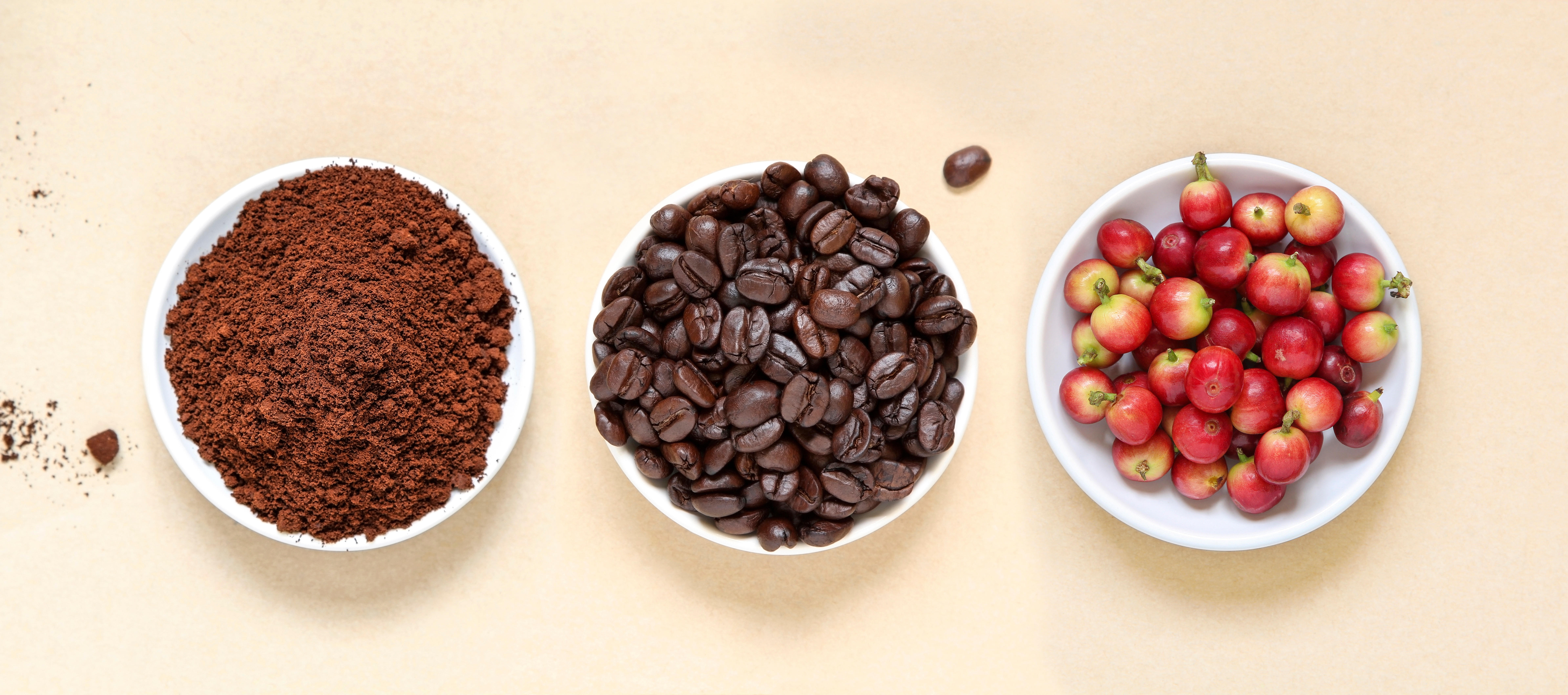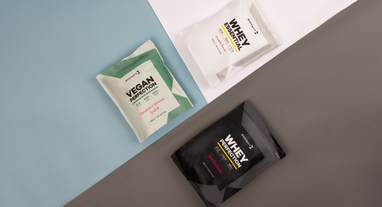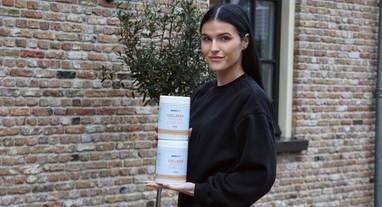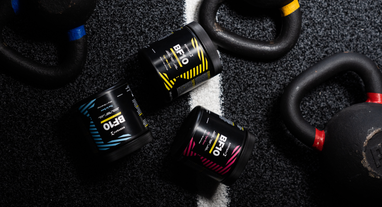What is caffeine and what does it do to your body?

The word ‘caffeine’ is derived from the German word ‘Kaffee’ and the French word ‘café’. It was first isolated from coffee beans in 1819 although its effects have been known for thousands of years. According to legend, an Ethiopian shepherd discovered the effects of caffeine way back in the eighth century when he noticed a change in his goat’s behaviour after eating the coffea plant. More than a little curious, he tried it out for himself and the rest, as they say, is history.
But what exactly is caffeine and what does it do to your body? Here, we look at the effects of caffeine on health, sleep, training and more to give you the complete lowdown on one of the most widely consumed substances in the world.
What is caffeine?
Caffeine is a natural substance found in more than 60 plants, including tea leaves, cacao pods and coffee beans. It’s also made artificially and added to certain foods and drinks. Caffeine acts as a stimulant on the central nervous system causing increased alertness and improved concentration when levels at or above 75mg are consumed. You’ll find it in tea, coffee, chocolate, soft drinks, energy drinks and certain over-the-counter medicines like painkillers and cold remedies.
Unlike many other psychoactive substances, caffeine is legal and unregulated in nearly all parts of the world. A white, bitter-tasting purine alkaloid, it belongs to the methylxanthine class of drugs and is chemically related to the adenine and guanine bases of deoxyribonucleic acid (DNA) and ribonucleic acid (RNA).

What does caffeine do to your body?
After you eat or drink something that contains caffeine, your body quickly and almost completely absorbs it. In most people, 99% of caffeine is absorbed after 30 to 120 minutes and its effects can be felt for long periods.
In short, caffeine works by fooling the receptors of an important molecule called adenosine. As the body runs out of energy (in the form of glucose), adenosine signals the brain to become sleepy, essentially telling us to sleep and rebuild our reserves. When caffeine arrives on the scene, it binds to the same receptors that adenosine would normally attach to. This blocks the sleepiness and speeds up cell activity, offering a feeling of focus and alertness. As the caffeine wears off, adenosine kicks back in to slow down this cell activity and make us sleepy again.
Additionally, caffeine causes increased neuron firing in the brain. The pituitary gland sees this as some kind of emergency and sets the production of adrenaline into motion. This ‘fight or flight’ hormone has several effects on the body:
- Your heart beats faster
- The muscles tighten (ready to act)
- Your blood pressure rises
- Your airways open
- The liver releases sugar into the blood for extra energy
- Your pupils dilate
This explains why you might feel tense, anxious and jittery after one cup of coffee too many or a highly caffeinated energy drink.
How much caffeine is too much?
It’s generally recommended for healthy adults not to consume more than 400mg of caffeine per day. So, be mindful of how many cups of coffee, tea or energy drinks you have throughout the day, especially if you’re taking any caffeinated medications or sports supplements like pre-workouts and fat burners.
How much caffeine is in coffee?
On average, there’s around 95mg of caffeine in a normal cup of freshly brewed coffee. A single espresso contains about 63mg and a double roughly 125mg. A cup of instant coffee typically contains 30-90mg of caffeine.
Despite the name, even decaf coffee has varying amounts of caffeine, with the average cup containing 3mg.
How much caffeine is in tea?
A cup of black tea generally has less caffeine than coffee — about 45mg — although depending on the variety can contain up to 90mg. Green teas, including matcha, have anywhere between 20-45mg of caffeine and white teas up to 60mg per cup (aside from redbush tea, which is completely caffeine free).
Note that even though many herbal teas are sold as ‘caffeine free’, there may still be small amounts (up to 12mg) of caffeine in there.
How much caffeine is in Coke?
A 300ml can of Coke contains 34mg of caffeine. A same-sized can of Diet Coke has 46mg. That’s not so much compared to a cup of coffee, but if you’re drinking both, it can soon add up throughout the day.
How much caffeine is in Monster energy drinks?
The majority of Monster energy drinks come in 500ml cans with varying levels of caffeine, ranging from 60mg to a whopping 300mg.
How much caffeine is in Red Bull energy drinks?
Red Bull, one of the most well-known energy drinks on the market, is roughly equivalent to a cup of coffee with 80mg of caffeine per 250ml can.
How much caffeine is in FIT ENERGY?
Each can of Body&Fit FIT ENERGY contains 100mg of naturally sourced caffeine. In addition, you’ll find 70mg of magnesium to support a normal energy-yielding metabolism. Unlike most other energy drinks, FIT ENERGY is also sugar free and contains 3.1g of amino acids, 625mg of taurine and 125mg of beta alanine per serving.

Is caffeine good for training?
The effects of caffeine on focus and alertness make it an ideal ingredient for many pre-workout performance supplements and energy drinks. These can be especially useful early in the morning when you might need that extra push to get out there and take on your goals. The caffeine content of energy drinks and pre-workouts can vary, so it’s best to choose one that’s right for you and your sensitivity levels. Our BF10 Pre-workout, for example, is for more experienced users with 200mg of caffeine per serving. Many people prefer not to take a pre-workout before every session, however, since the desired effects can diminish as the body gets used to it.
Check out our pre-workout supplements 101 to learn more about pre-workouts and how our complete range can support your training.
What other supplements are used with caffeine?
Many gym enthusiasts, bodybuilders and endurance athletes use caffeine alongside other popular ingredients found in performance supplements. These include creatine (which increases physical performance in successive bursts of short-term, high intensity exercise), BCAAs, nitric oxide boosters and glutamine.
It’s important to note that while these supplements may be effective when used in combination with caffeine, they should not be used as a substitute for a balanced and nutritious diet. Additionally, it’s always best to consult with a healthcare professional before starting any new supplement regimen, especially if you are an athlete or have any underlying health conditions.
Is caffeine addictive?
The World Health Organisation (WHO) formally recognised caffeine addiction as a clinical disorder in 2012. It’s easy to see why your body enjoys it. It blocks adenosine to make you feel focused and alert. It injects adrenaline into the system. It also manipulates the body’s dopamine (one of the ‘feel-good’ hormones) levels in a similar way to heroin and cocaine. Of course, caffeine’s effects are much weaker, yet experts believe this is what contributes to caffeine addiction.
What are the symptoms of caffeine withdrawal?
If the body is dependent on caffeine and you decide to eliminate it from your diet, caffeine withdrawal symptoms can kick in after 12-24 hours. Just like addiction, caffeine withdrawal is recognised as a clinical disorder. Its symptoms include:
-
Headache
-
Fatigue
-
Anxiety
-
Difficulty concentrating
-
Irritability
-
Low energy
You can ease caffeine withdrawal symptoms by cutting back slowly (rather than quitting cold turkey), staying hydrated and getting enough sleep.
How long does caffeine last?
The American Academy of Sleep Medicine states that the half-life of caffeine is up to five hours. This means that if you’ve had an energy drink containing 80mg of caffeine, five hours later, there will still be 40mg in your system. Due to these long-term effects, it’s recommended to avoid coffee, energy drinks or any other caffeinated products in the late afternoon and evening. Especially if you want to get some proper sleep.
Caffeine and sleep
As we’ve seen, adenosine is important when it comes to drifting off into the land of nod. If the caffeine in your body is still blocking those adenosine receptors at 10, 11, 12 o’clock at night, your body is not really benefitting from deep sleep (find out more about that in our guide to sleeping well). Even though you may still be able to fall asleep a few hours after consuming caffeine.
This can turn into a vicious cycle. After a poor night’s sleep, you feel tired and less able to focus, so what do you do? You grab a coffee. Then, the cycle continues, your tolerance builds, and you need to drink more to fight off caffeine withdrawal.
Effects of caffeine on health
There are thousands of studies on the positive effects of caffeine. Aside from increasing alertness and improving concentration, however, it has few proven health benefits. Experts recommended moderation when it comes to caffeine consumption. There’s still a long way to go to find out any real long-term positive effects.

Caffeine: the bottom line
Coffee, energy drinks and pre-workout supplements are a great way to get the focus and alertness you need on long days at the office or to help you through intense workouts. It’s just important not to overdo it. If you’re trying to cut down on caffeine and your energy levels have taken a hit, try exercising, drinking more water, meditation and eating nutrient rich foods as an alternative source of fuel. Do you have any further questions surrounding caffeine, energy drinks or any of our products containing caffeine? Then feel free to get in touch with our dedicated team of Nutrition Experts via Instagram or our customer service channel.
#FINDYOURFIT
Sources:
Sleep and Caffeine | Benefits and Risks | Sleep Education
Caffeine Use Disorder: A Comprehensive Review and Research Agenda - PMC (nih.gov)
9 Reasons Why (the Right Amount of) Coffee Is Good for You | Johns Hopkins Medicine




